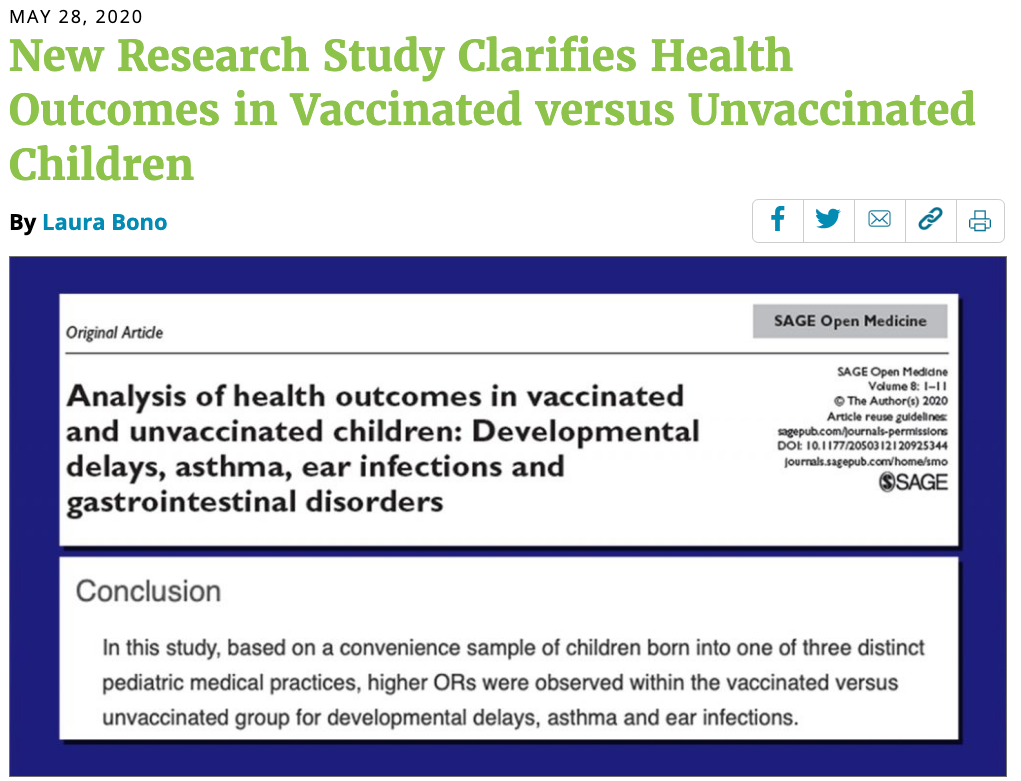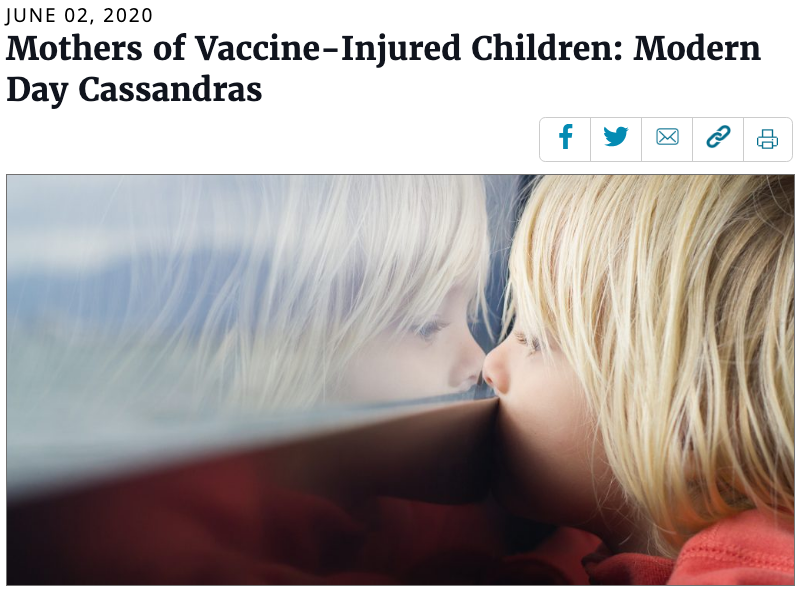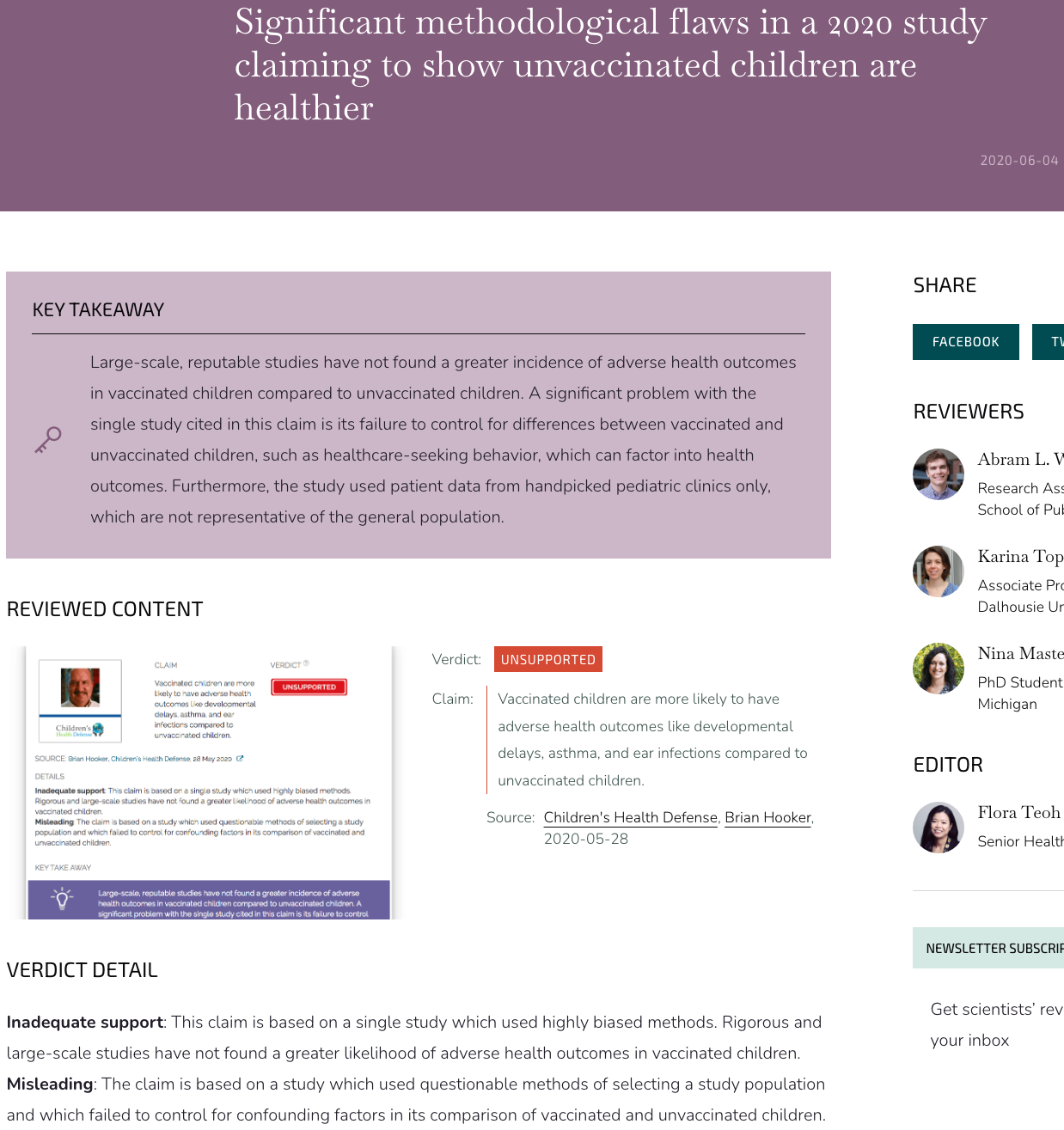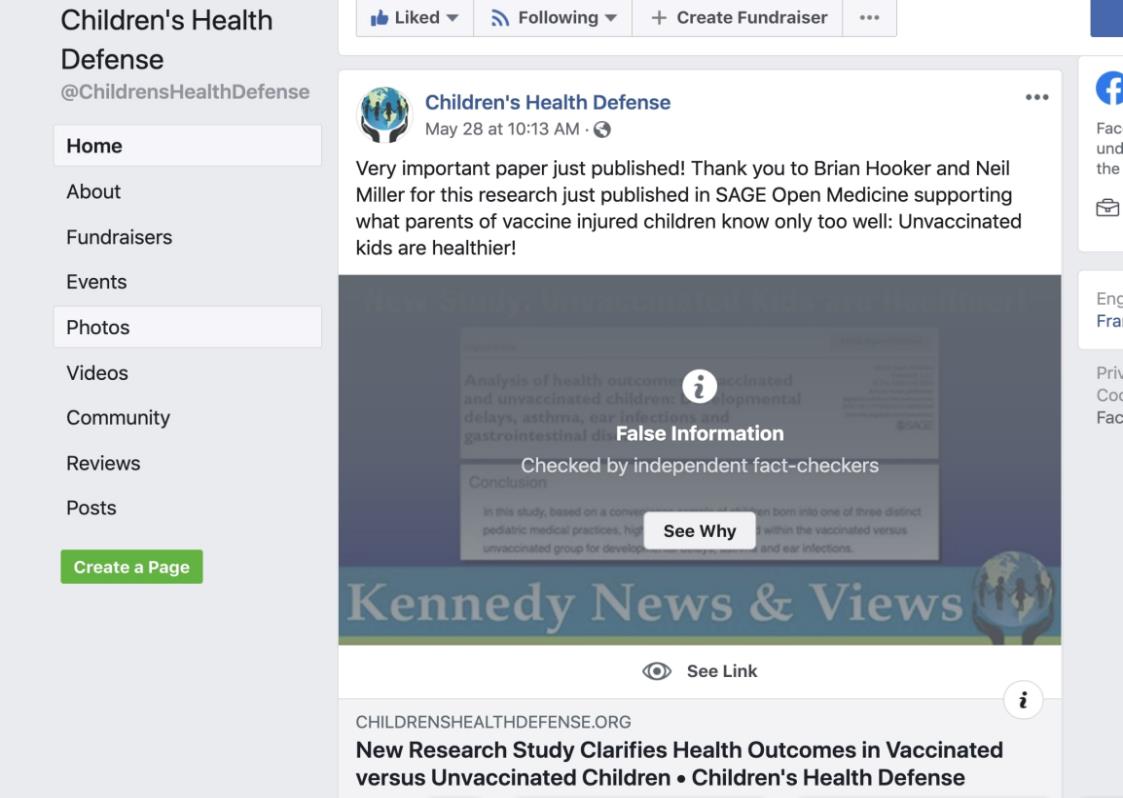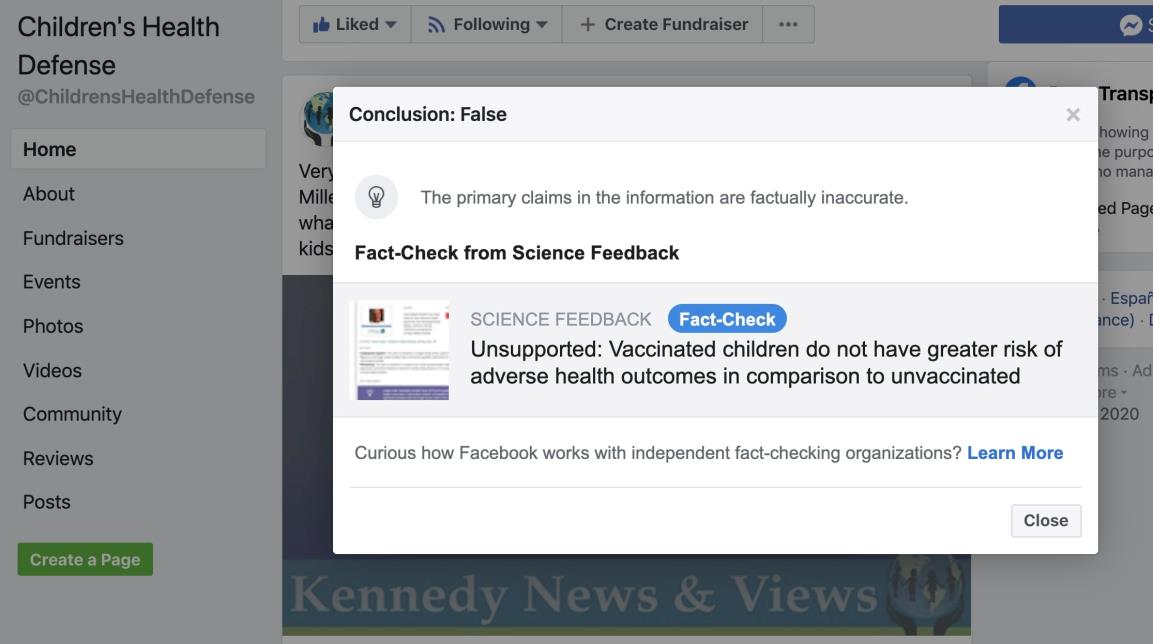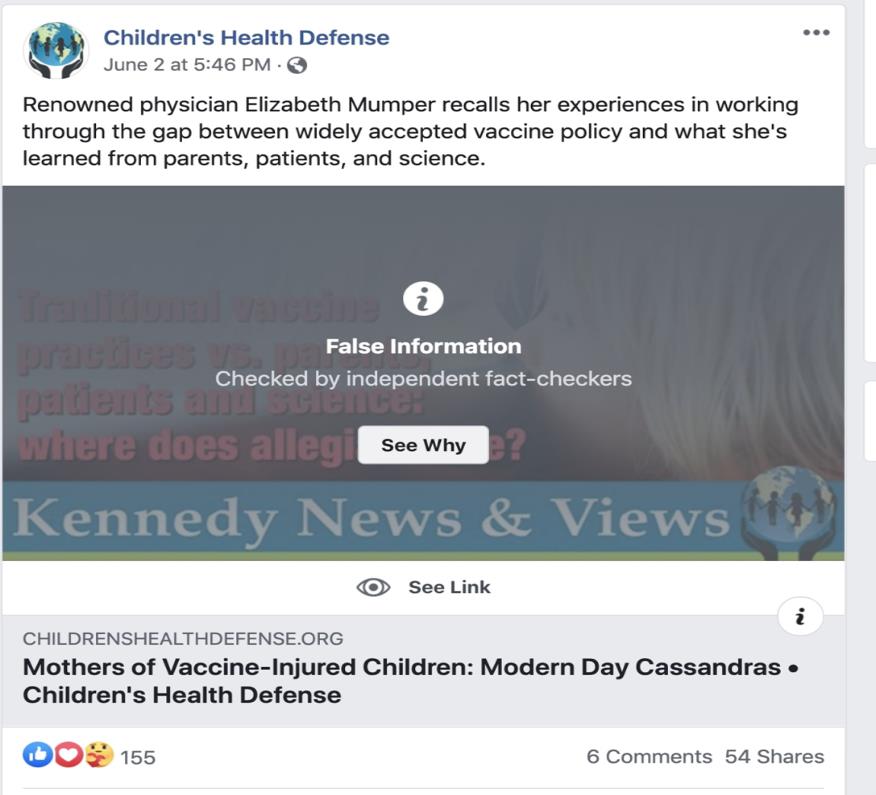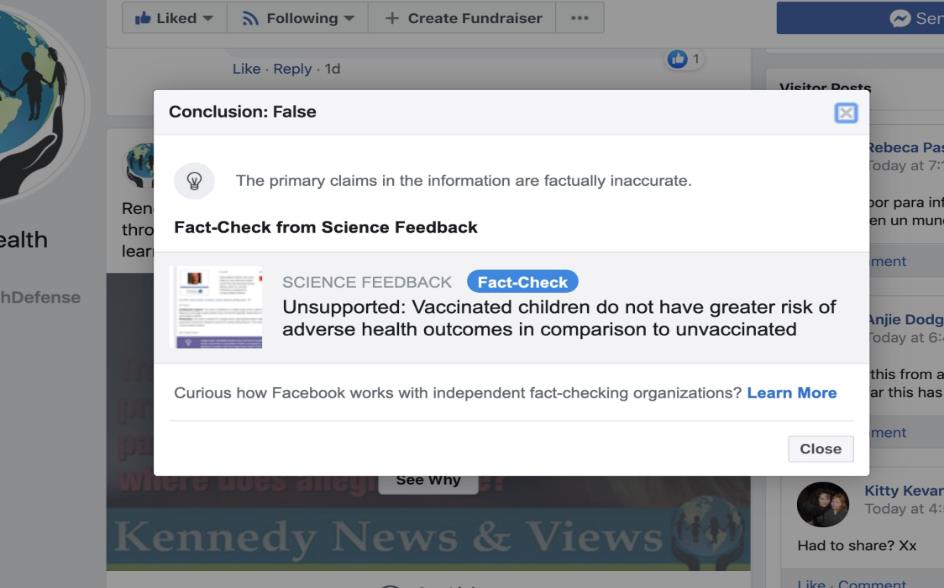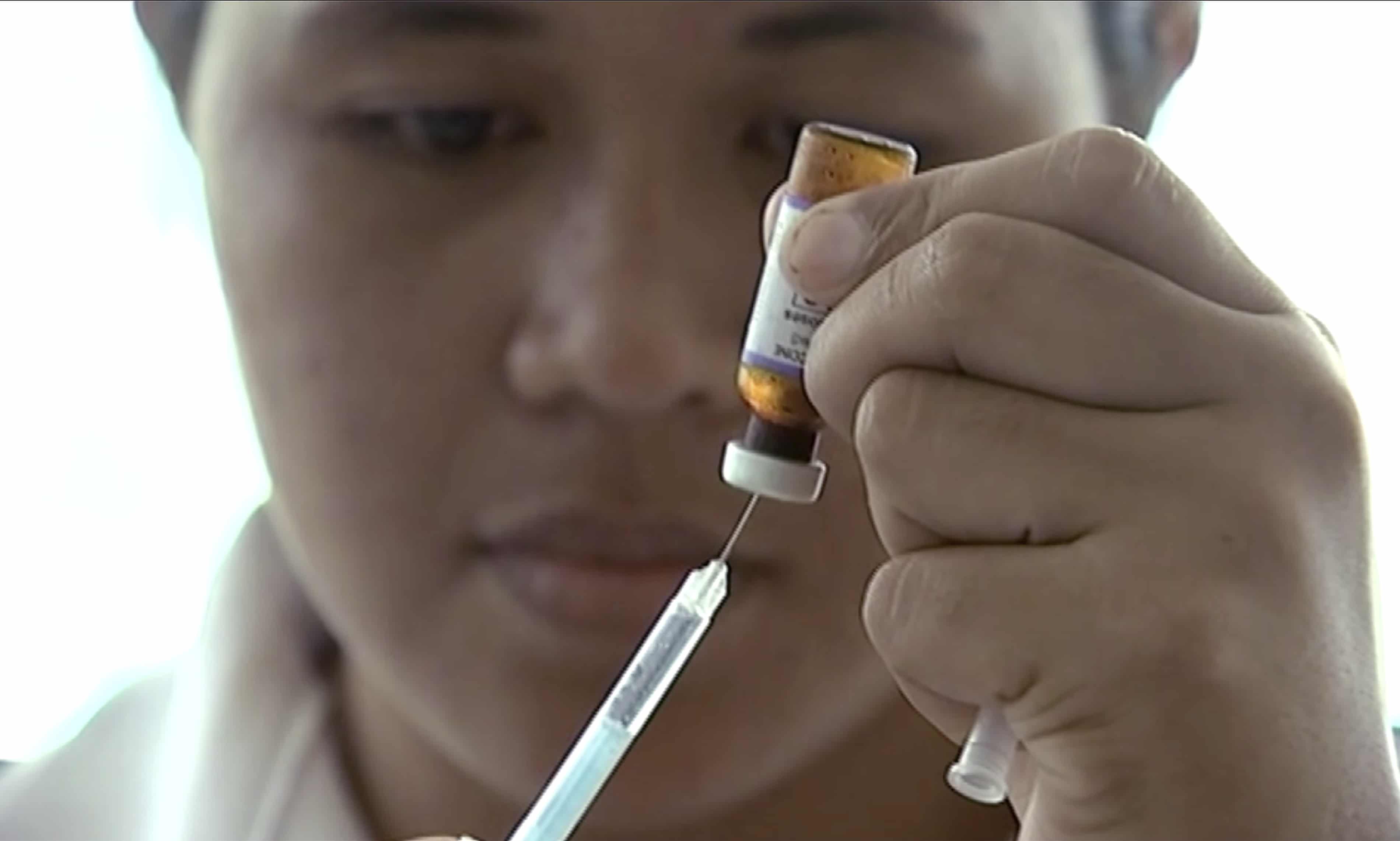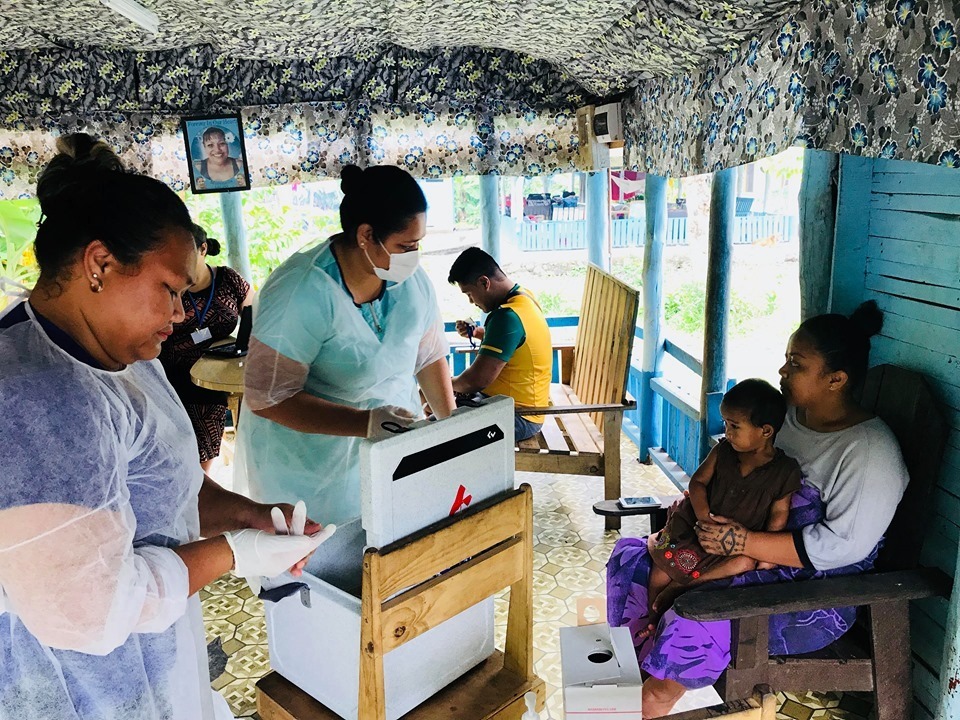MISLEADING CLAIMS
Health outcomes in vaccinated vs unvaccinated children?
Background
On or about May 28, 2020, CHD’s Facebook page posted a link to an article on their website by Laura Bono reporting on a study by Dr. Brian Hooker and Neil Miller concerning health outcomes in a small sample of vaccinated and unvaccinated children (Figure 1). Science Feedback checked information in the article, an ‘independent third-party fact checker’ working with Meta (which owns Facebook and Instagram, among other platforms).
On or about June 2, 2020, CHD’s Facebook page posted a link to an article on their website concerning Dr. Elizabeth Mumper’s account of her medical practice experience evaluating children and families over many decades (Figure 2). Dr. Mumper’s article was apparently checked by Science Feedback because it cited the aforementioned 2020 Hooker and Miller study.
Contested claim: Vaccinated children are more likely to have adverse health outcomes like developmental delays, asthma, and ear infections compared to unvaccinated children (CHD, Bono, 200528 citing Hooker and Miller, 2020; CHD, Elizabeth Mumper, 200602)
Science Feedback’s fact-check
Science Feedback’s fact-check verdict: Unsupported (200604)
Facebook action: False information (200528) (no link available)
Context: Science Feedback deemed the results from Hooker and Miller’s study (2020) “unsupported,” asserting the claim is also misleading since it is based on a highly biased study, and “rigorous and large-scale” studies have not found a greater likelihood of adverse effects in vaccinated children (Figure 3). Elizabeth Mumper’s article posted on the CHD website received the same treatment (Figure 6 and Figure 7) from Science Feedback and Facebook as the previous CHD article by Bono, by apparent virtue of the fact that Mumper cited Hooker and Miller’s study. Facebook added the following warning label to the posts: “False information Checked by independent fact-checkers” (Figure 4 and Figure 6, for Bono’s and Mumper’s articles, respectively). Moreover, upon clicking the “See Why” button shown in Figure 4 and Figure 6, Facebook indicated: “Conclusion: False — The primary claims in the information are factually inaccurate,” citing Science Feedback’s fact-check (Figure 5 and Figure 7).
Verdict detail: “Inadequate support: This claim is based on a single study which used highly biased methods. Rigorous and large-scale studies have not found a greater likelihood of adverse health outcomes in vaccinated children. (Science Feedback, 200604).
“Misleading: The claim is based on a study which used questionable methods of selecting a study population and which failed to control for confounding factors in its comparison of vaccinated and unvaccinated children.” (Science Feedback, 200604).
Our assessment
Supported: Hooker and Miller’s claim that observed vaccination in children was associated with increased odds of adverse health outcomes compared with unvaccinated children is supported by their study, however flawed or prone to bias in its methodology. Elizabeth Mumper’s article posted on the CHD website received the same treatment from Science Feedback and Facebook as Bono’s article, by apparent virtue of the fact that Mumper cited Hooker and Miller’s study. Still, it is not the “primary” claim (Figure 7) of her article, as Facebook asserts.
Several limitations were acknowledged by the investigators (Hooker and Miller, 2020), along with the desire for more reliable data and a more thorough evaluation of vaccinated versus unvaccinated populations to understand the associated health effects better. Nevertheless, their findings are not “unsupported” (Figure 3), nor are they “misleading” as Science Feedback’s fact-check asserts, nor are they “false information” (Figure 4), nor are their “primary claims” “factually inaccurate” (Figure 5), as Facebook asserts.
While the data may be flawed and prone to bias — all studies — including randomized controlled trials (RCTs), share the same limitations to varying degrees. The results of a single study cannot be deemed “false information” because other studies contradict the results. Hooker and Miller did not perform a systematic review or meta-analysis, which is how Science Feedback appeared to approach their fact-check. Science Feedback’s fact-check asserts, “Rigorous and large-scale studies have not found a greater likelihood of adverse health outcomes in vaccinated children” (Figure 3). While a comprehensive evaluation of this statement is beyond the scope of this review, even if this assertion is assumed to be accurate, it doesn’t render Hooker and Miller’s results untrue or unsupported. It is entirely conceivable that something else besides vaccination status can better explain the associated differences in their study that they didn’t uncover — especially given its limitations — however, labeling the study as “factually inaccurate” is itself inaccurate and deceptive. The lack of rigorous research into vaccine adverse events renders causal claims on either side of the ledger unsubstantiated. Hooker and Miller explicitly do not make such claims, however, causal language is employed when Science Feedback’s fact-check is summarized on Facebook’s warning label as “Vaccinated children do not have greater risk of adverse health outcomes in comparison to unvaccinated” (Figure 5).
Assessment highlights:
- Science Feedback’s fact-check asserts that Hooker and Miller’s results observing that vaccination before one year of age was associated with increased odds of medical diagnoses of developmental delays, asthma, and ear infections in children compared with unvaccinated children is “unsupported” since it was a single study using highly biased methods and “large-scale studies have not found a greater likelihood of adverse health outcomes in vaccinated children.” They also explain the findings are misleading because the study used “questionable methods of selecting a study population and which failed to control for confounding factors in its comparison of vaccinated and unvaccinated children.”
- Hooker and Miller acknowledge that “The main weakness of this study is the use of a convenience sample of three different pediatric practices.” They also point out the small sample size (n = 4,821) and the available data only allowed for calculating unadjusted observational associations, yielding observations with a substantial vulnerability to unknown confounding factors biasing the results.
- The investigators concluded, “In this study, which only allowed for the calculation of unadjusted observational associations, higher ORs were observed within the vaccinated versus unvaccinated group for developmental delays, asthma and ear infections. Further study is necessary to understand the full spectrum of health effects associated with childhood vaccination” (Hooker and Miller, 2020).
- The results of a single study cannot be deemed “false information” because other studies contradict the results. Given the admissions by the investigators about the limitations of their research, it is difficult to conceive how this information misleads a reader.
Respondent’s reply
CHD filed a lawsuit claiming that Facebook, its CEO Mark Zuckerberg, and associated fact-checking organizations unfairly targeted and censored their content. The lawsuit alleges that this censorship violated CHD’s constitutional rights by collaborating with government entities to suppress free speech, falsely labeling CHD’s content as misinformation, engaging in deceptive and coordinated efforts to discredit their work, and causing significant reputational and financial harm. The following excerpt is taken from CHD’s 2020 complaint document.
Respondent: CHD (CHD vs Facebook Complaint, 201113)
- 4.130 | This purportedly neutral Science Feedback “fact-check” is itself a misrepresentation of material fact. Dr. Hooker, the author of the original study, disclosed in that study the small size of his study sample, the statistical methods he employed on that small sample, and the results he obtained, all of which is fully consistent with the scientific method. Any reasonable reader of the study would be fully empowered to interpret for himself or herself whether those statistical results have broader applicability, particularly in light of the author’s conclusion that broader studies are warranted. Instead, Facebook holds out its “factchecker’s” opinion critical of the study methodology as conclusive “fact.” Facebook’s classification of the original study as factually “false” is deceptive and materially misleading.
- 4.131 | …Science feedback’s primary criticism of the Hooker and Miller 2020 study was the use of a convenience sample which refers to a cohort of 2,047 children, whose data the authors studied from three separate pediatric practices in the United States. However, convenience samples are used routinely in epidemiology, and also form the basis for the FDA’s approval of drugs and biologics.
- 4.132 | Science Feedback relies upon as its source, Dr. David Gorski, a blogger who states, “Basically, no matter how you analyze a convenience sample, you can’t generalize it to the larger population.” This is false and misleading. The CDC’s own studies, some of which are cited in the “fact-checking” article, are almost exclusively based on convenience samples. …
- 4.133 | On June 2, 2020 and thereafter, Facebook and Science Feedback, its purportedly “independent fact-checker,” blocked CHD from displaying Dr. Elizabeth Mumper’s personal account of her medical practice experience evaluating children and families over many decades …
- 4.136 | Upon clicking the “See Why” button in [Figure 6], the user is shown the following scroll with the notice, “The primary claims in the information are factually inaccurate” [Figure 7]. But, the only citation for this notice is Dr. Brian Hooker’s small scale study referenced supra [Hooker and Miller, 2020]. Dr. Hooker’s study is cited by the article, but it is neither its “primary” claim nor, in any event, is it false.
Science Feedback’s fact-check is inaccurate
Highlights:
- Hooker and Miller’s claim that observed vaccination in children was associated with increased odds of adverse health outcomes compared with unvaccinated children is supported by their study, however flawed or prone to bias.
- Several limitations were acknowledged by the investigators (Hooker and Miller, 2020), along with the desire for more reliable data and a more thorough evaluation of vaccinated versus unvaccinated populations to understand the associated health effects better. Nevertheless, their findings are not “unsupported” nor “misleading” as Science Feedback’s fact-check asserts (Figure 3), nor are they “false information” (Figure 4) nor their “primary claims” “factually inaccurate” (Figure 5), as Facebook asserts.
- The results of a single study cannot be deemed “false information” because other studies contradict the results. Science Feedback’s fact-check asserts, “Rigorous and large-scale studies have not found a greater likelihood of adverse health outcomes in vaccinated children” (Figure 3). While a comprehensive evaluation of this statement is beyond the scope of this review, even if this assertion is assumed to be accurate, it doesn’t necessarily render Hooker and Miller’s results untrue and unsupported.
